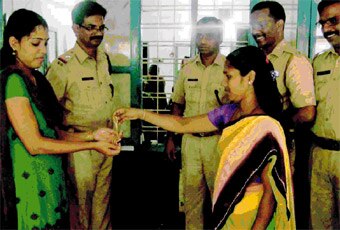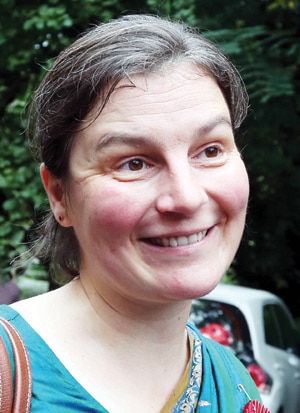വാടാനപ്പള്ളി:
പല വീടുകളില്നിന്ന് ശേഖരിച്ച പഴയ വസ്ത്രങ്ങള് വില്പ്പനക്കാരന്
നല്കാനെടുക്കുമ്പോഴാണ് അതില് ഒരു ഷര്ട്ടിന്റെ പോക്കറ്റില്നിന്ന്
അഞ്ചരപ്പവന് തൂക്കമുള്ള സ്വര്ണ്ണമാല താഴെ വീണത്. ലക്ഷ്മിയെന്ന
നാടോടിപ്പെണ്ണിന്റെ മനസ്സിളക്കാന് ആ പൊന്നിന് കഴിഞ്ഞില്ല. തനിക്കും
കുഞ്ഞിനും അന്നത്തിന് വഴി കണ്ടെത്താന് പഴയ തുണികള് ശേഖരിച്ച്
വില്ക്കുന്ന ലക്ഷ്മിയുടെ നേരിന് സ്വര്ണ്ണത്തേക്കാള്
തിളക്കമുണ്ടായപ്പോള് അഞ്ചേരി ഓടത്തുപറമ്പില് അഭിലാഷിെന്റ ഭാര്യ ലിജിക്ക്
താലിമാല തിരികെ കിട്ടി.
കണ്ണില് കണ്ടതെല്ലാം കവരുന്നവരാണ് തന്റെ
വര്ഗ്ഗക്കാരെന്ന സമൂഹത്തിന്റെ ധാരണയാണ് ലക്ഷ്മി തിരുത്തിയത്. നേരിന്റെ
നാടോടിനന്മയ്ക്ക് പോലീസിന്റെ പ്രശംസയും ലഭിച്ചു.
കോയമ്പത്തൂര്ക്കാരിയാണ് ലക്ഷ്മി. ഭര്ത്താവ് ഉപേക്ഷിച്ചുപോയി.
മാതാപിതാക്കള് നേരത്തെ മരിച്ചു. വര്ഷങ്ങളായി ഇടശ്ശേരി പടിഞ്ഞാറുള്ള വാടക
ഷെഡ്ഡിലാണ് കഴിയുന്നത്. തൊഴിലിന്റെ ഭാഗമായി വ്യാഴാഴ്ച അഞ്ചേരി
ഭാഗത്തെത്തിയ ലക്ഷ്മിക്ക് ഏതാനും വീട്ടുകാര് പഴയ വസ്ത്രങ്ങള് നല്കി.
ലിജിയും വസ്ത്രങ്ങള് നല്കിയിരുന്നു
താമസസ്ഥലത്ത് തിരിച്ചെത്തിയ
ലക്ഷ്മി ശേഖരിച്ച തുണികള് പഴയ വസ്ത്രങ്ങള് വാങ്ങുന്ന അമ്പാടിക്ക്
കൊടുക്കാന് എടുത്തപ്പോഴാണ് ഒരു ഷര്ട്ടില്നിന്ന് സ്വര്ണ്ണമാല
ലഭിച്ചത്. തന്റേതല്ലാത്ത മുതല് ഉടമക്ക് തിരിച്ചെത്തിക്കണമെന്ന്
തീരുമാനിക്കാന് ലക്ഷ്മിക്ക് ഒട്ടും സമയം വേണ്ടിവന്നില്ല. പക്ഷേ,
ആരുടേതാണെന്ന് അവള്ക്ക് മനസ്സിലായില്ല. ലക്ഷ്മി, ഷെഡ്ഡിനടുത്ത് ചായക്കട
നടത്തുന്ന കൃഷ്ണന്റെ സഹായം തേടി. അമ്പാടിയും കൃഷ്ണനുമൊത്ത്് വ്യാഴാഴ്ച
വൈകീട്ടു തന്നെ സ്വര്ണ്ണമാല വാടാനപ്പള്ളി സ്റ്റേഷനിലെത്തിച്ചു.
സ്വര്ണ്ണമാല
നഷ്ടപ്പെട്ടതറിഞ്ഞ ലിജിയും വീട്ടുകാരും ഇതിനിടെ വീട്ടിലാകെ തിരഞ്ഞു.
ആലോചിച്ചപ്പോള് ഷര്ട്ടിനുള്ളില് പെട്ടിട്ടുണ്ടാകുമെന്ന് തോന്നി.
അലമാരയില്നിന്നാണ് പഴയ വസ്ത്രങ്ങള് നാടോടിസ്ത്രീക്ക് നല്കിയത്. മാലയും
അലമാരയിലായിരുന്നു. വാടാനപ്പള്ളി ഭാഗത്താണ് സ്ത്രീ താമസിക്കുന്നതെന്ന്
പറഞ്ഞിരുന്നതിനാല് വാടാനപ്പള്ളി പോലീസ് സ്റ്റേഷനിലെത്തി വിവരം പറഞ്ഞു.
എന്നാല്,
ഞെട്ടിയത് ലിജിയായിരുന്നു. തന്റെ സ്വര്ണ്ണമാല ലക്ഷ്മി അവിടെ
ഏല്പ്പിച്ചുവെന്നറിഞ്ഞപ്പോഴായിരുന്നു ഇത്. വെള്ളിയാഴ്ച രാവിലെ
സ്റ്റേഷനില് ലിജി എത്തിയപ്പോള് ലക്ഷ്മി അവിടെയുണ്ടായിരുന്നു. എസ്.ഐ.
സജിന് ശശി, അഡീഷണല് എസ്.ഐ. ടി.സി. കലാധരന്, സീനിയര് സി.പി.ഒ. ടി.
ജയകുമാര്, റൈറ്റര് പി.എസ്. സുജിത്ത് എന്നിവരുടെ സാന്നിധ്യത്തില് ലക്ഷ്മി
ലിജിക്ക് സ്വര്ണ്ണമാല കൈമാറി.
























